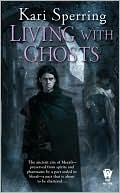First Book Friday: Kari Sperring
It’s been a while, but First Book Friday is back, at least for today! Previous entries in the series are indexed here, and the submission guidelines are over there.
Kari Sperring (LJ, Twitter, Facebook), aka Kari Maund, has written many books, though she’s relatively new as a fantasy novelist. She joins us to talk about selling her first books (both nonfiction and fiction), and the importance of being very specific when making wishes…
#
You probably don’t want to know about my first book. I realised a few weeks ago that it’s twenty years old this year. I can see it from where I’m sitting writing this, its dark-brown cover a little battered with use, though the silver embossed writing proclaiming author and title is as sharp as ever. I’m still proud of it, after all this time, even though back on the day of its publication – summer 1991, I think, though the exact date is gone from my memory – I greeted it with mixed feelings. I’d wanted to be a published writer since I was six or seven, but I’d failed to be specific in my wording. One must be careful what one wishes for: there it was, my first book, the product of four years of research and study and writing: Ireland, Wales and England in the eleventh century: some paradigms for political interaction.
It’s still out there, in libraries, on shelves, in second-hand bookshops, though it’s been out of print now for a decade or more. Four years of my life between two neat brown covers: the clean final version of my PhD dissertation, published by an academic press, without fanfare or advance, though it earned me about £2000 over the next seven or eight years. I still like that book, I like its carefulness and orderliness, its sharp clear arguments and twenty years on I still stand by my conclusions. It’s been a good friend and a good ally and in the end it may be what I’m remembered for, if I’m remembered at all. It sits there over my desk in a short row with my other five non-fiction books, and the jumble of my articles, my first career in a foot or less.

That was 1993. It very nearly sold, to a newish British publisher. They bought me lunch and took me seriously, but then someone was fired and someone else left and a new person was hired and, well, I wasn’t their find, so… I put the book in a drawer and went back to my Welsh princes. And that might have been it, had it not been for a friend, who asked to read it a few years later. She liked it. She was – and still is – an established sf writer, and she sent the manuscript on to her US publisher. And there it sat, for publishers are busy people, and so are academics, and then I’m quite ridiculously rule-bound. My friend’s publisher had it, and another big US publisher already had it, and I hadn’t heard from them and the *rules* say not to make simultaneous submissions. (And I am so not a good role model.)
Years passed, and I wrote the rest of those academic books, and made various false starts on new novels, and wrote reams of stuff just for fun, and Living With Ghosts sat in its drawer. My friend periodically asked about it, and her publisher said, ‘It looks interesting but we haven’t had a chance to get to it.’ And that was that, until 2006, when I entered and won a short story competition. The chair of judges – the estimable and authoritative Ian Watson – looked at me hard (and, let me tell you, a Hard Stare from Ian is a Very Serious Thing) and said, ‘Enough of the non-fiction, young lady’. I went hone, and hauled Living With Ghosts out from its drawer and reread it, and once I was done shuddering (what had I been thinking? It was far too long and far too overblown, and… Well, you get the picture) I sat down and revised it, and sent it off to a small UK press who specialise in sff.
They offered to publish it. I was delighted. Here at last was the book I’d wished for all those years ago, before I learned to be so careful with my words. My prospective editor asked if any other publishers still had it, and I told her about those two big US publishers, and added, ‘But I don’t think they’re interested.’ We agreed that I would write to both and inform them the book was sold, as a matter of courtesy. One publisher did not reply. The other – my friend’s publisher – emailed right back and asked for a week to read it. My UK publisher kindly agreed. And the following week, the US publisher rang me with an offer. That was May 2007: Living With Ghosts came out from DAW Books in March 2009. They recently bought another two books from me: one, The Grass King’s Concubine should hopefully be out in 2012.
And that’s my story. I would not be where I am, I would not have sold the books I have sold without the kindness and support of other writers. In particular I would not be here without Lisanne Norman and Ian Watson and Storm Constantine. And, y’know, many many thousands of words about Welsh princes. (The non-fiction is under my other name, K L Maund/Kari Maund, for anyone who’s interested.) The kindness of other writers never ceases to astonish me: and here’s another writer who’s offered me his support and encouragement, and let me witter on all over his blog. So thank you, Jim, for having me here.





